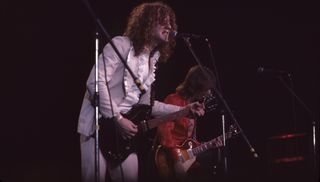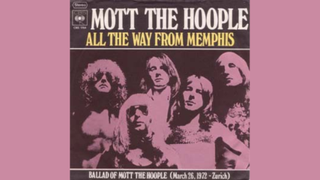“I took Brian May's Red Special off him to show him what I was trying to explain about the song. You should've seen the look on his face! He was petrified”: Ian Hunter on Mott the Hoople’s All the Way From Memphis
Poorly promoted by the band's record label, All the Way From Memphis nonetheless became a classic, and was later covered by Michael Schenker and Brian May

For Ian Hunter, the tale of a mislaid guitar has been the bones to Mott the Hoople’s 1973 classic All the Way From Memphis. But now, 50 years later, he wants to set the record straight about the forgotten “six-string razor” that sets the tale in motion.
“That was really a bit of poetic license,” Hunter admits. “[Lead guitarist] Mick Ralphs’ guitar was actually stolen at a gig in Long Island a little earlier on our American tour in late ’72, not left behind.” Ralphs also had a fear of flying, and Hunter worried he might skip the Memphis gig after his guitar got lifted.
“All he had to do was go back to England and it would have been all over,” Hunter says. “Which I figured he would do. But in the end, he did the gig.”
Memphis magic
Its U.S. roots aside, All the Way From Memphis was birthed in Hunter’s home in Wembley, London, in 1973. “I had just gotten married, and we had this old upright piano, with all the white notes gone,” he recalls. “So I started playing around with the black notes, and that’s how the music came together. But the lyrics took weeks.”
Back then, you’d see an artist with a top-five single and a Platinum album, but they were broke
Ian Hunter
It was while musing over the dramas of that 1972 tour that Hunter suddenly happened upon the song’s subject matter.
“I remembered we’d done that gig in Memphis just before that Christmas, where Joe Walsh was opening for us,” he explains. “A lot of weird things happened. We were told nobody was going to be at the gig, but we hit the stage to a full house. It was kind of a magic night, so the lyric was based around that.”
The rollicking piano and sax interplay, as well as Ralphs’ lead guitar, reinforce the lyric’s “merrily we go to hell” attitude, as perfectly encapsulated in the line, “You look like a star but you’re still on the dole.”
Hunter agrees. “People don’t realize the investment that goes into it all, which the artist has got to pay off. All this stuff costs money, and the labels have to recoup it. That’s why, back then, you’d see an artist with a top-five single and a Platinum album, but they were broke.”
Mainly a Les Paul man
When it came time to record the song, the group entered Abbey Road Studios to lay it down for their next album, Mott. Ralphs recorded his blistering lead lines using his standard guitar-and-amp setup of a Les Paul Jr. into a Marshall amp. “Mick was mainly a Les Paul man,” Hunter recalls. “We had a great engineer in Bill Price, who improved everything we did. That helped a lot to make everything sound great.”
Columbia rules the airwaves
Mott already had a strong following in the U.K., where All the Way From Memphis climbed to No. 10 on the charts. In the U.S, the group’s record label prioritized it to album-oriented FM radio stations rather than the Top 40 AM stations, and the song failed to chart.
“Columbia Records really didn’t know how to market us,” Hunter says. “They thought we were an FM band, and so they weren’t pushing any AM singles. We said, ‘Well, it doesn’t seem to be doing the Rolling Stones any harm, as they’re getting pushed on both AM and FM.’ But for some reason they just pushed us to FM, and it never got airplay.”

Regardless, Mott – the album – hit an impressive number 35 on the Billboard 200 chart and helped All the Way From Memphis reach a wider audience than the band’s previous efforts. The song remains a fan favorite and has been covered by the short-lived early ’90s Michael Schenker/Tracii Guns outfit Contraband, and even by Brian May, who included it on his 1998 solo album, Another World, aided by Hunter.
“Brian was lovely to work with, a great guitar player and great person,” Hunter reveals. “And he’s a very serious kind of guy. We did the Astoria in London one time, and Brian was going to get up and play with us, but he’s very picky about his guitar, especially his Red Special.
“I was with him in the dressing room trying to explain something about the song. I said, ‘Here, wait a minute,’ and took his guitar off him to show him what I was trying to explain. And you should have just seen the look on his face! He was petrified. He was so scared. There’s just something about guitars and that song.”
Get The Pick Newsletter
All the latest guitar news, interviews, lessons, reviews, deals and more, direct to your inbox!
Joe Matera is an Italian-Australian guitarist and music journalist who has spent the past two decades interviewing a who's who of the rock and metal world and written for Guitar World, Total Guitar, Rolling Stone, Goldmine, Sound On Sound, Classic Rock, Metal Hammer and many others. He is also a recording and performing musician and solo artist who has toured Europe on a regular basis and released several well-received albums including instrumental guitar rock outings through various European labels. Roxy Music's Phil Manzanera has called him "a great guitarist who knows what an electric guitar should sound like and plays a fluid pleasing style of rock." He's the author of two books, Backstage Pass; The Grit and the Glamour and Louder Than Words: Beyond the Backstage Pass.

Who is Chris Herin and why are Peter Frampton, Alex Lifeson and Martin Barre playing lead guitar on his new album?

“When she died, she was literally the last person I had in my life. I fell apart. I didn't care anymore.” Chris Impellitteri nearly gave up when tragedies took his family. Guitar kept him alive
Most Popular








